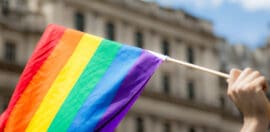Beyond a rainbow sticker: The strong case for LGBTIQ+ inclusion

10 August 2021 at 8:00 am
By not adding in questions about sexual orientation, gender identity, or variations in sex characteristics, this year’s census has failed the LGBTIQ+ community. Until LGBTIQ+ people are counted, they remain invisible, writes Nevena Spirovska.
The health, wellbeing, and mental health of LGBTIQ+ people has been at crisis levels for decades with no signs of improvement. Almost one third of LGBTIQ+ people have attempted suicide at some point in their lives and one in 20 report having attempted suicide in the last 12 months, a rate thirteen times higher than non-LGBTIQ+ people.
Let those numbers sink in. One third have attempted suicide at some point in their lives. This isn’t just a statistic, it’s a national emergency.
In Australia, approximately one in every 10 people identify as members of the rainbow community, however, this number cannot be accurately substantiated due to data collection flaws in the census. Once again, the census has failed lesbian, gay, bisexual, transgender, intersex, and queer people as well as rainbow parents because the Australian Bureau of Statistics (ABS) and the responsible minister, Michael Sukkar, chose not to add in questions about sexual orientation, gender identity, or variations in sex characteristics.
Of particular concern is the census’ erasure of transgender people, who will be forced to input the sex they were assigned at birth or select the “non-binary” option which may not accurately represent their gender identity. This not only leads to flawed and incorrect data, but also to poor public policy. As acting director of community health at ACON Teddy Cook rightly highlighted, “census data enables funding, it enables health systems and governments to be able to apply resources to areas that are needed”. Without it, we can’t have an accurate picture of how many LGBTIQ+ people and families there are across the country, where they live, and what their circumstances are. Until LGBTIQ+ people are counted, they remain invisible.
Perhaps then it’s unsurprising that LGBTIQ+ communities have access to less than 50 cents in every 100 dollars of available resources from philanthropy and government. Funding and resources aren’t drying up, they weren’t there in the first instance. LGBTIQ+ organisations already do so much with very little. However, with less than 0.1 per cent of philanthropic funding flowing through to LGBTQ+ communities, it’s difficult to know where future funding will actually be coming from.
The LGBTIQ+ sector is small but growing, with only a handful of LGBTIQ+ community-led organisations that are operated by and for LGBTIQ+ people across the country. Despite the funding and resourcing challenges many of these organisations face, the work they continue to do is invaluable. LGBTIQ+ organisations are described by the people who use them as “life-saving” because they provide a safe and welcoming environment, with access to vital resources and information that comes with community care and understanding. They are even more important during COVID times, when so many LGBTIQ+ people are disconnected from their communities, queer spaces, and broader support networks.
Allied organisations across the social services sector also play an important role in supporting LGBTIQ+ people and can demonstrate their commitment to improving the lives of LGBTIQ+ people as well as building strong, safe, and sustainable LGBTIQ+ communities who can enjoy the full benefits of community, educational, and economic participation. That commitment includes ensuring services go beyond just being a “rainbow sticker” and that they’re genuinely inclusive and affirming.
Indeed, allied organisations and their workers can come together to demonstrate their solidarity with rainbow communities; they can pursue Rainbow Tick accreditation, undertake affirmative action for a particular roles to ensure greater visibility and representation, support LGBTIQ+ campaigns, and, in consultation with LGBTIQ+ organisations or communities, advocate on their behalf in budget submissions and when speaking with government representatives. This type of action underscores the urgency with which system-wide change needs to occur to address the health and wellbeing disparities experienced by LGBTIQ+ people.
Recently, a group of peak social services sector organisations came together and created the “Australian-first” Embracing Equality Charter to show their commitment to making positive change as allies of LGBTIQ+ communities. The Embracing Equality Pledge has also been developed for individual service providers to sign onto as they commit to work toward safe and culturally appropriate services for LGBTIQ+ people. The role of allies cannot be underestimated in the fight for equality.
It shows how far we’ve come when LGBTIQ+ specific health, wellbeing, and inclusion issues are out in the open and being discussed. But it also shows how far we still have to go, as the health and wellbeing of LGBTIQ+ people remains at crisis levels. There is no one best way to fight discrimination and inequities experienced by LGBTIQ+ people. A nomination of approaches are needed, including allies of LGBTIQ+ communities standing up for LGBTIQ+ people and their rights. Actions must count.
If you or someone you know is experiencing issues with mental health, please contact Lifeline Australia on 13 11 14 or Kids Helpline on 1800 55 1800. For anonymous, LGBTI peer support and referral, contact QLife on 1800 184 527.








A lot to think about here. I will be speaking with my CEO to see what changes we can take at our organisation
The government is effectively rendering this part of the community invisible: sweeping LGBTQIA+ people under the rug. We talk about minorities, however if we add all these minorities together, they would become the majority. Things need to change.